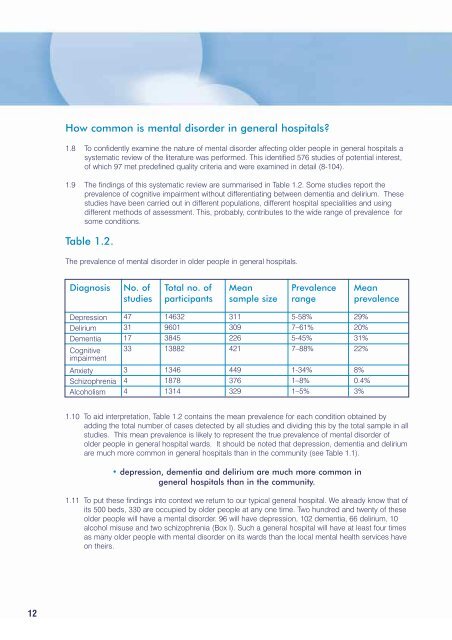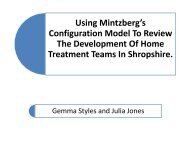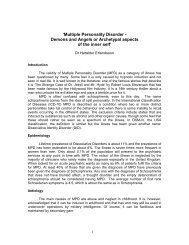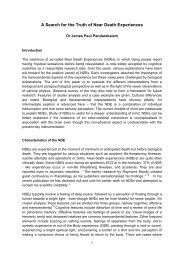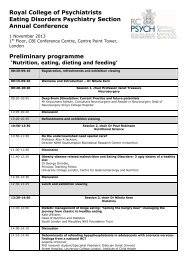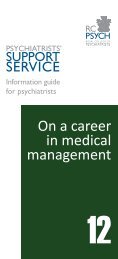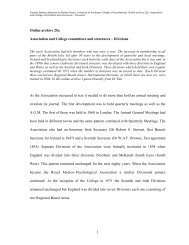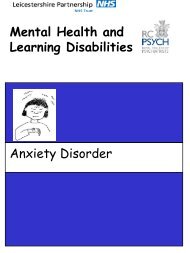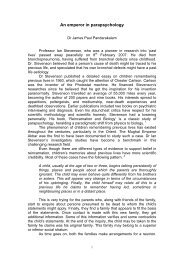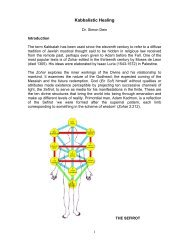Who Cares Wins - Royal College of Psychiatrists
Who Cares Wins - Royal College of Psychiatrists
Who Cares Wins - Royal College of Psychiatrists
Create successful ePaper yourself
Turn your PDF publications into a flip-book with our unique Google optimized e-Paper software.
12<br />
How common is mental disorder in general hospitals?<br />
1.8 To confidently examine the nature <strong>of</strong> mental disorder affecting older people in general hospitals a<br />
systematic review <strong>of</strong> the literature was performed. This identified 576 studies <strong>of</strong> potential interest,<br />
<strong>of</strong> which 97 met predefined quality criteria and were examined in detail (8-104).<br />
1.9 The findings <strong>of</strong> this systematic review are summarised in Table 1.2. Some studies report the<br />
prevalence <strong>of</strong> cognitive impairment without differentiating between dementia and delirium. These<br />
studies have been carried out in different populations, different hospital specialities and using<br />
different methods <strong>of</strong> assessment. This, probably, contributes to the wide range <strong>of</strong> prevalence for<br />
some conditions.<br />
Table 1.2.<br />
The prevalence <strong>of</strong> mental disorder in older people in general hospitals.<br />
Diagnosis<br />
Depression<br />
Delirium<br />
Dementia<br />
Cognitive<br />
impairment<br />
Anxiety<br />
Schizophrenia<br />
Alcoholism<br />
No. <strong>of</strong><br />
studies<br />
47<br />
31<br />
17<br />
33<br />
3<br />
4<br />
4<br />
Total no. <strong>of</strong><br />
participants<br />
14632<br />
9601<br />
3845<br />
13882<br />
1346<br />
1878<br />
1314<br />
Mean<br />
sample size<br />
311<br />
309<br />
226<br />
421<br />
449<br />
376<br />
329<br />
Prevalence<br />
range<br />
5-58%<br />
7–61%<br />
5-45%<br />
7–88%<br />
1-34%<br />
1–8%<br />
1–5%<br />
1.10 To aid interpretation, Table 1.2 contains the mean prevalence for each condition obtained by<br />
adding the total number <strong>of</strong> cases detected by all studies and dividing this by the total sample in all<br />
studies. This mean prevalence is likely to represent the true prevalence <strong>of</strong> mental disorder <strong>of</strong><br />
older people in general hospital wards. It should be noted that depression, dementia and delirium<br />
are much more common in general hospitals than in the community (see Table 1.1).<br />
• depression, dementia and delirium are much more common in<br />
general hospitals than in the community.<br />
Mean<br />
prevalence<br />
29%<br />
20%<br />
31%<br />
22%<br />
8%<br />
0.4%<br />
3%<br />
1.11 To put these findings into context we return to our typical general hospital. We already know that <strong>of</strong><br />
its 500 beds, 330 are occupied by older people at any one time. Two hundred and twenty <strong>of</strong> these<br />
older people will have a mental disorder. 96 will have depression, 102 dementia, 66 delirium, 10<br />
alcohol misuse and two schizophrenia (Box I). Such a general hospital will have at least four times<br />
as many older people with mental disorder on its wards than the local mental health services have<br />
on theirs.


